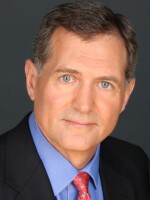AILSA CHANG, HOST:
Irregular diplomatic channels, a quid pro quo - Washington fixated on these terms during the recent public impeachment hearings, but in the background is a years-long conflict between Ukraine and Russia. Those two countries are set to meet next week. And NPR's Greg Myre looks at how the impeachment inquiry has changed the dynamic.
GREG MYRE, BYLINE: The U.S. impeachment debate is still raging, yet one foreign leader sounds perfectly content with what he heard. Russian President Vladimir Putin.
(SOUNDBITE OF ARCHIVED RECORDING)
PRESIDENT VLADIMIR PUTIN: (Through interpreter) Thank God no one is accusing us of interfering in the U.S. elections anymore. Now they're accusing Ukraine.
MYRE: Matthew Rojansky is with the Woodrow Wilson Center. He says Putin has good reasons to enjoy the spectacle. First, Russia interfered in the 2016 election without serious repercussions. Second, some Republicans now suggest Ukraine was to blame. And third, the resulting political turmoil in the U.S. just keeps multiplying.
MATTHEW ROJANSKY: This moment is Vladimir Putin's fantasy moment for American vulnerability. All of it adds up together to a kind of policy paralysis. You know, that is exactly what the Russians want to see happen.
MYRE: And there's more. Putin's now in a stronger position as he heads into his first meeting with Ukraine's president, Volodymyr Zelenskiy. They'll try to resolve the war between their countries at a December 9 meeting in Paris.
ANGELA STENT: This is really very unfortunate for President Zelenskiy.
MYRE: Angela Stent heads the Russian studies program at Georgetown University.
STENT: In many ways, he is weakened because the Russians realize that the kind of solid U.S. support that was there for Ukraine apparently isn't there anymore, particularly since we've had these reports that President Trump isn't interested in Ukraine and doesn't really want to deal with it.
MYRE: Ukraine has struggled since gaining independence in the 1991 breakup of the Soviet Union. Yet many analysts say Zelenskiy's landslide victory in April gives the country a fresh start. Zelenskiy is just 41 years old, with no political experience aside from playing a comedic president on TV before he got the job for real. Again, Matthew Rojansky.
ROJANSKY: I would describe him as, like, the Jon Stewart or the Stephen Colbert of Ukrainian politics. He's a very sophisticated, very clever political satirist who now finds himself with an overwhelming mandate because he was elected by close to three quarters of Ukrainians.
MYRE: It's far too early to tell if Zelenskiy will succeed, but it's not too early for the U.S. to build a policy consensus on Ukraine, says Rojansky. It's even more important to prevent Russian interference in the 2020 U.S. election.
ROJANSKY: I think they will be able to foment chaos by targeting the most vulnerable fissures in our society. And sadly, that's all very much on display right now in and around the impeachment process.
MYRE: Marie Yovanovitch, the ousted U.S. ambassador to Ukraine, said U.S. politicians used to speak with one voice on foreign affairs. In a recent congressional testimony, she cited Arthur Vandenberg, a Republican senator who coined the phrase we must stop partisan politics at the water's edge. He worked closely with Democratic President Harry Truman as the U.S. built global institutions from the ashes of World War II. Angela Stent says this is still a vitally important idea.
STENT: That notion seems to have now been jettisoned particularly in the current administration. But I think it should not be outdated. It's something that we hopefully can revive.
MYRE: By sending mixed signals abroad, Stent adds, the U.S. confuses partners like Ukraine and helps rivals like Russia.
Greg Myre, NPR News, Washington. Transcript provided by NPR, Copyright NPR.






